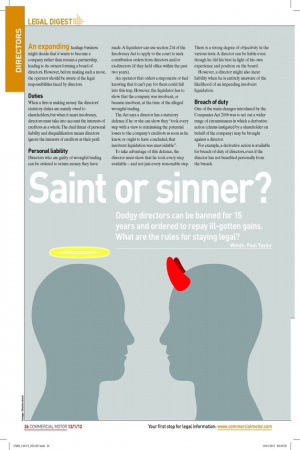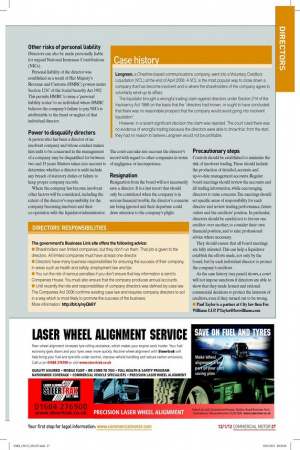Saint or sinner?
Page 18

Page 19

If you've noticed an error in this article please click here to report it so we can fix it.
Dodgy directors can be banned for 15 years and ordered to repay ill-gotten gains. What are the rules for staying legal?
Words: Paul Taylor
An expanding haulage business might decide that it wants to become a company rather than remain a partnership, leading to its owners forming a board of directors. However, before making such a move, the operator should be aware of the legal responsibilities faced by directors.
Duties
When a irm is making money the directors’ statutory duties are mainly owed to shareholders, but when it nears insolvency, directors must take into account the interests of creditors as a whole. The dual threat of personal liability and disqualiication means directors ignore the interests of creditors at their peril.
Personal liability
Directors who are guilty of wrongful trading can be ordered to return money they have made. A liquidator can use section 214 of the Insolvency Act to apply to the court to seek contribution orders from directors and/or ex-directors (if they held ofice within the past two years).
An operator that orders components or fuel knowing that it can’t pay for them could fall into this trap. However, the liquidator has to show that the company was insolvent, or became insolvent, at the time of the alleged wrongful trading.
The Act says a director has a statutory defence if he or she can show they “took every step with a view to minimising the potential losses to the company’s creditors as soon as he knew, or ought to have concluded, that insolvent liquidation was unavoidable” .
To take advantage of this defence, the director must show that he took every step available – and not just every reasonable step. There is a strong degree of objectivity in the various tests. A director can be liable even though he did his best in light of his own experience and position on the board.
However, a director might also incur liability when he is entirely unaware of the likelihood of an impending insolvent liquidation.
Breach of duty
One of the main changes introduced by the Companies Act 2006 was to set out a wider range of circumstances in which a derivative action (claims instigated by a shareholder on behalf of the company) may be brought against a director.
For example, a derivative action is available for breach of duty of directors, even if the director has not beneited personally from the breach.
Other risks of personal liability
Directors can also be made personally liable for unpaid National Insurance Contributions (NICs).
Personal liability of the director was established as a result of Her Majesty’s Revenue and Customs (HMRC) powers under Section 121C of the Social Security Act 1992. This permits HMRC to issue a ‘personal liability notice’ to an individual where HMRC believes the company’s failure to pay NICs is attributable to the fraud or neglect of that individual director.
Power to disqualify directors
A person who has been a director of an insolvent company and whose conduct makes him unit to be concerned in the management of a company may be disqualiied for between two and 15 years. Matters taken into account to determine whether a director is unit include any breach of statutory duties or failure to keep proper company records.
Where the company has become insolvent other factors will be considered, including the extent of the director’s responsibility for the company becoming insolvent and their co-operation with the liquidator/administrator. The court can take into account the director’s record with regard to other companies in terms of negligence or incompetence.
Resignation
Resignation from the board will not necessarily save a director. It is a last resort that should only be considered when the company is in serious inancial trouble, the director’s concerns are being ignored and their departure could draw attention to the company’s plight.
Precautionary steps
Controls should be established to minimise the risk of insolvent trading. These should include the production of detailed, accurate and up-to-date management accounts. Regular board meetings should review the accounts and all trading information, while encouraging directors to raise concerns. The meetings should set speciic areas of responsibility for each director and review trading performance, future orders and the creditors’ position. In particular, directors should be careful not to favour one creditor over another, to consider their own inancial position, and to take professional advice where necessary.
They should ensure that all board meetings are fully minuted. This can help a liquidator establish the efforts made, not only by the board, but by each individual director to protect the company’s creditors.
As the case history (see panel) shows, a court will not impose sanctions if directors are able to show that they made honest and rational commercial decisions to protect the interests of creditors, even if they turned out to be wrong.
• Paul Taylor is a partner at City law irm Fox Williams LLP. PTaylor@foxwilliams.com
Case history
Langreen, a Cheshire-based communications company, went into a Voluntary Creditors Liquidation (VCL) at the end of April 2006. A VCL is the most popular way to close down a company that has become insolvent and is where the shareholders of the company agree to voluntarily wind-up its affairs.
The liquidator brought a wrongful trading claim against directors under Section 214 of the Insolvency Act 1986 on the basis that the “directors had known, or ought to have concluded, that there was no reasonable prospect that the company would avoid going into insolvent liquidation”.
However, in a recent significant decision the claim was rejected. The court ruled there was no evidence of wrongful trading because the directors were able to show that, from the start, they had no reason to believe Langreen would not be profitable.
DIRECTORS’ RESPONSIBILITIES
The government’s Business Link site offers the following advice: • Shareholders own limited companies, but they don’t run them. That job is given to the directors. All limited companies must have at least one director.
• Directors have many business responsibilities for ensuring the success of their company, in areas such as health and safety, employment law and tax.
• You run the risk of serious penalties if you don’t ensure that key information is sent to Companies House. You must also ensure that the company produces annual accounts.
• Until recently the role and responsibilities of company directors was defined by case law. The Companies Act 2006 confirms existing case law and requires company directors to act in a way which is most likely to promote the success of the business.
More information: http://bit.ly/nyQk6Y












































